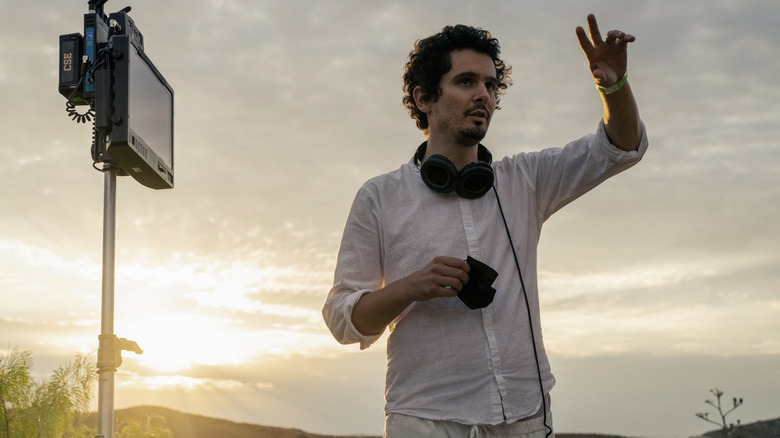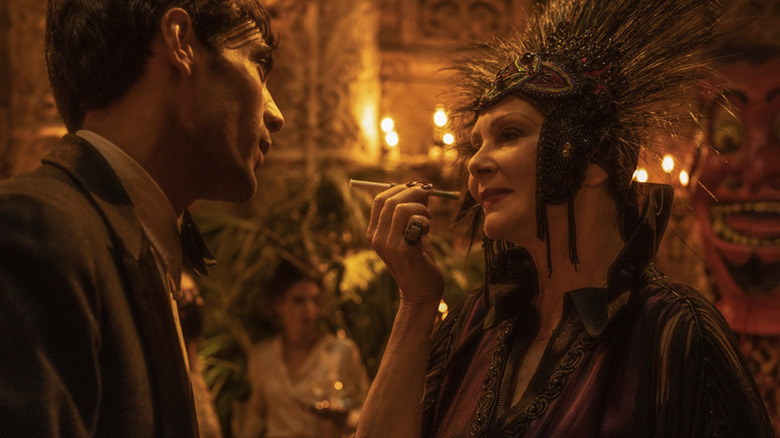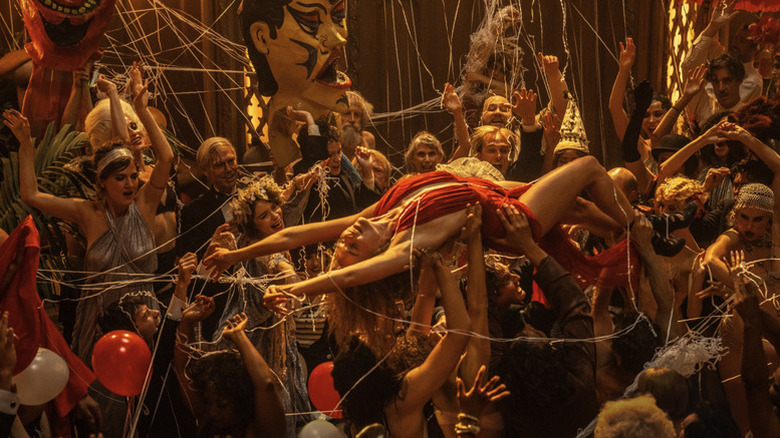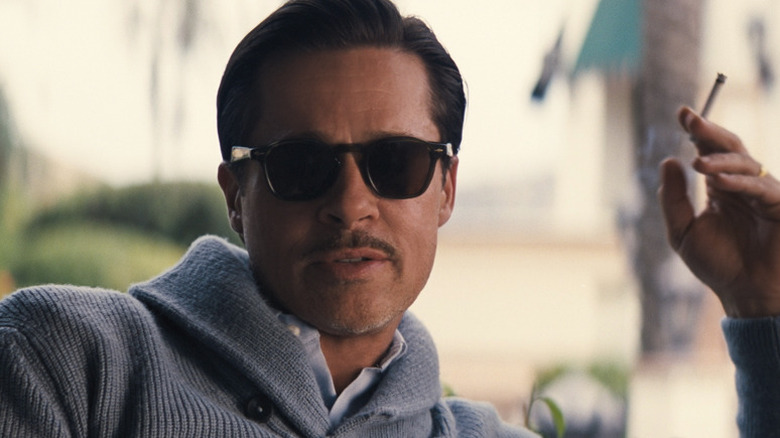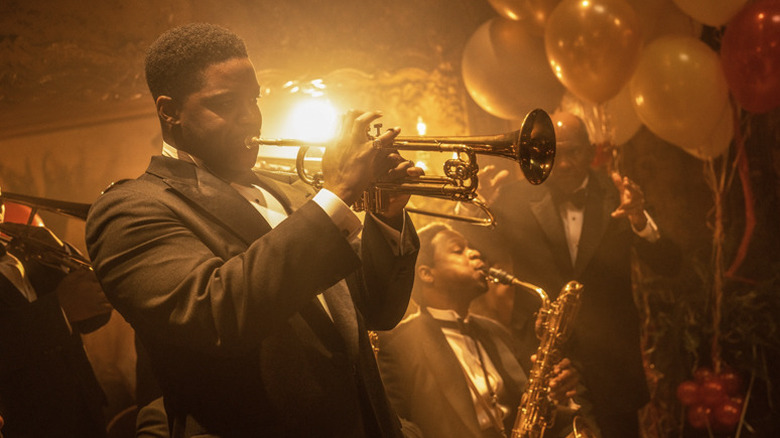Damien Chazelle On Babylon's Fantastic Jean Smart Speech And That Bravura Ending [Exclusive Interview]
The following post contains spoilers for "Babylon."
In 2009, Damien Chazelle made his feature directorial debut with the little-seen indie "Guy and Madeline on a Park Bench." That same year, he pitched a producer the idea for "Babylon," a sprawling period piece which would show the darker side of Hollywood's transition from silent films to talkies. At the time, the producer considered it an "impossible" movie to make, so it was put on the back burner. Chazelle went on to write and direct "Whiplash," "La La Land," and "First Man" and earned the distinction of becoming the youngest person to win an Academy Award for Best Director. With his newfound clout, he was finally able to convince Paramount to let him make the movie, and the result is a raunchy, relentless, no-holds-barred look at a period that has often been glamorized beyond recognition. "Babylon" has proven to be somewhat divisive among critics, but it's one of my favorite movies of 2022.
I had a spoiler-filled conversation with Chazelle about some of the film's best moments, including that incredible speech Jean Smart's character gives to Brad Pitt's character and that bravura ending montage, as well as the impact of "Singin' in the Rain" on this script and what he thinks about the current state of the film industry.
Note: This interview has been lightly edited for clarity and brevity.
'You realize that actually she was the smartest person in the room all along'
The Elinor St. John speech to Jack Conrad is one of my favorite movie moments of 2022. What do you remember about conceiving and executing that?
It went through some different iterations. The basic idea was tied up with how I wanted to present Elinor St. John as a character: That the person who seems like a buffoon and almost like a caricature of herself at first, and you only realize late in the game, the way that Jack Conrad, Brad [Pitt]'s character, does, you realize that actually she was the smartest person in the room all along and that she sees things in a way that the rest of the people who are in it are incapable of seeing. So, knowing at the outset that scene between the two of them would be a "pulling the rug out from underneath you" scene, would be a scene where we see a new side of her, and then as a result of what she says, you hopefully see a new side of Jack Conrad because he's never actually been confronted in this way.
In some ways, it's actually what he's been begging for throughout the rest of the movie. You see him often begging for people to just be honest with him. It's the thing that probably goes out the window most quickly when you're a movie star, is people actually willing to just call a spade a spade to your face. And he goes in thinking he is going to basically rule the roost with Elinor as he thinks he always has. She's always seemed to be someone who's just pecking at his hand, and he thinks he's going to throw his weight around and finds that actually, he's in for something very different. But in some ways, she gives him the gift of honesty. So when he says "thank you" at the end of the scene, yes, he's not in a happy place, but there maybe is something genuine to that "thank you."
Did it take a lot of drafts to eventually reach the specific language she uses to convey that information to him?
Yeah, it did. I definitely remember, I'd write a pass at the scene and then sit with it for a bit and come back to it and read it and hate it and write it again and come back later and hate it. I kept playing with it, and I think the first time that I reached some version of the scene that felt decent, it stayed like that in the script for quite some time. And I forget exactly when, because this project had a long kind of gestation period, but at some point, maybe shortly before prep, I remember talking with one of the producers, Matt Plouffe, about it, and I think something was maybe not sitting quite right with either of us, and I think we both just felt like there was one more step for the scene to go. It hadn't quite gotten to the real meat of it. I hadn't gone far enough, basically.
So I think I then wound up going back in, using what we had on the page already as a starting point, and just writing more and having Elinor continue. So there is a little bit of this moment now that I can kind of recognize it in the scene where she murders him in the first two-thirds of the scene. But then, where my first instinct had been to end the scene, she continues. And where I think it actually gets most interesting is where she, not builds him back up, but tries to deliver some kind of ... "comfort" is the wrong word, because it's still pretty damn blunt, but some kind of hope to him. And that would be even more interesting than just the sort of simpler "mic drop, I just schooled you" kind of approach to the scene.
'I guess I remain an optimist'
It's clear to me from the ending that you believe in the power of cinema, but at the same time, that shot of the camera flying above the audience and showing all the different types of people who used to go to the movie theater together, it almost feels like a eulogy or a bittersweet look back at a time where that used to happen, but might never happen again. What were you thinking about when he chose to film it in that way?
Well, I guess I remain an optimist, because if you think about when that scene takes place at the end of the movie, that's 1952, that means that audience sitting in the theater was being told a lot of the same things as we're being told today. They were being told that movie theaters were on their way out. They were being told that cinema was dead. They were being told that television had replaced it. Hollywood was in a pretty bad place in the fifties going into the sixties. They had just lost control of movie theaters that they had all through the thirties and forties with the Supreme Court decision in 1948. Divesting themselves as theater chains and not knowing what the hell to do — they hadn't yet figured out ancillaries — so they're just suddenly losing a huge amount of their control and profits.
Meanwhile, television is huge and just seems to be getting bigger and bigger and bigger every year. I mean it was, in retrospect, the end of the Hollywood studio system — at least a certain incarnation of it. But of course, Hollywood and cinema was not at its end. Of course, a lot of great stuff was still to come. So I guess I sort of feel similarly about today. We're in a period of transition, we're in a period of maybe contraction. We're definitely in a period that's very difficult for a lot of people in this industry, but I think if we just stick it out and not throw in the towel, I think if we look back on this period in 50, 100 years from now, it'll feel very similar, I think, to the way we now think of the fifties and even the period depicted earlier in this movie, the transition in the twenties and thirties.
'It felt like there could be space for this almost darker companion piece'
So, tell me about the "Singin' in the Rain" of it all, because you do this really interesting thing where you position the events of this movie as things that inspire what happens in "Singin' in the Rain." Tell me about that decision.
Yeah, well ... I forget exactly how it initially took shape, but certainly, my first time encountering the subject matter of the transition from silent to sound was through "Singin' in the Rain." It's one of my favorite movies of all time, and I'd say that's a movie where you're just smiling from beginning to end. So I remember taking such pleasure in the depiction of those fumblings and that kind of clumsy transition. Then there was a little bit of cognitive dissonance when I started doing some research and reading more and started reading about things like, people actually not getting back on their feet the way they do at the end of that film. People [dying by] suicide, a spate of overdoses and deaths sweeping through Hollywood, and most careers never resuscitating, and in some ways, an entire way of life and way of making movies really being obliterated.
So it felt like there could be space for this almost darker companion piece. Someone joked the other day to me — I want to steal it now — [that "Babylon" is] the evil cousin or evil twin to what had been depicted before. I think that got me going and got me looking at the period in a different way, and then really looking at what came before sound and looking at the insanity of the period that preceded it and realizing, in some ways, that the reason that sound was such a cataclysmic event for this society was that it was such a seat-of-your-pants, circus-like society that was almost not even a society, the way we would define it. It almost wasn't even an industry yet.
It was more fragile than I think people on the ground really realized because it was so unregulated, it was so free-for-all, everyone was living such insane lives. You party like that, you think it can go on forever, and then suddenly real life comes knocking on the door and you are screwed, because you're just not equipped to handle it. That's my metaphor in my mind for Hollywood at that time. It was uniquely ill-equipped to handle a sea change like what happened. But you can't tell that story, I think, without acknowledging "Singin' in the Rain" in some way. And of course, the wonderful irony that the roots of "Singin' in the Rain," even that song, dates from that period, and even that song being found, and in some ways it felt like a microcosm of the movie as well. But the first time that song is put on film is in this really weird, clunky, clumsy ... it's kind of beautiful, but if you watch "The Hollywood Revue of 1929" or watch that scene, it is like what we depict on screen. I mean, it's very weird. You definitely get a sense that Hollywood is trying to figure out these first clumsy steps, figure out what will become the polished Hollywood musical, but is not yet that. That's fascinating, too, I think.
'Ultimately, it's the accidents that lead you to more inspiration'
Tell me about creating that big montage at the end. You could have obviously included clips from any movie. What was the process like for choosing what felt right for what you wanted to accomplish there?
A lot of it was very instinctive at first. It was just trying to imagine, "What would the ideal shape of the scene be?" and not think at all about what could actually be clearable or this or that. For me, it was a sequence about evolution, about this life cycle of cinema, about the death and rebirth of cinema and about the idea that cinema is always dying and always somehow surviving. So that was the logical underpinning that unites every clip in there and dictates the structure of it to a certain extent. But beyond that, I did try to not overthink it too much, a lot of it did feel like ... I don't know, I've never experienced what action painting might feel like, but it felt like the editing equivalent of that. Of just throwing things into the mix and then you see — you try to do it without thinking too much, and then you see what works and what doesn't.
Some of it doesn't work at all, and then you really do have to roll up your sleeves and grapple with it. But some parts of what you've almost blindly thrown in work in a way that you could never have thought through, you know what I mean? That there's some gut connections and associations that some of these images wind up having across each other. Sometimes across big divides of the years. So, we wound up with a version of the scene that then we had to go actually figure out how to clear and make reality. We had an incredible team helping clear clips, and we were very lucky, given a short amount of time, that the vast majority of it was able to stay as it had initially been conceived. And then those little parts where I did have to swap something out, I think ultimately it made it better. Ultimately, it's the accidents that lead you to more inspiration that push it forward. So, it was all around a sort of lucky experience.
One of our writers spoke with producer Matthew Plouffe and asked how much the movie had changed since you originally pitched it to him back in 2009, and he said, surprisingly, not that much. That final montage, would you say that is the thing that changed the most over the course of making this movie?
Yeah, probably. That said, I think the emotion behind that scene was always the intention of the ending. It just took us a moment to figure out how to convey it. In script form, the ending was just full of a lot of ... it didn't reference specific movie clips, but it was full of a lot of description. There's a few big thick paragraphs of description at the end that try to convey what's going on in Manny's head and what he's feeling and that weird cauldron of emotions. That's what we initially had in our gut, but it took some trial and error, I think, to figure out how to actually make that something that would come across on screen for an audience.
"Babylon" is in theaters now.
